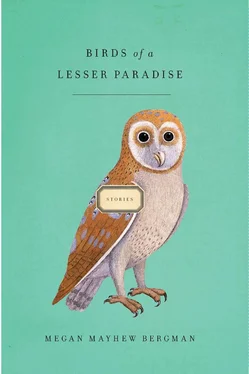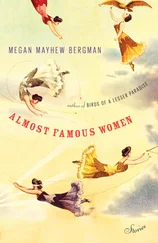How do you know this is the right bird? Ike asks.
I did my research, I say. And he hates me. He’s spiting me with silence.
Please talk, Ike says to Carnie. Carnie bobs his head up and down and bites his leg, a gesture that strikes me as the bird equivalent of thumbing one’s nose.
Just say something, I think. Anything. Just let me hear her again.
I’m surprised when I remember phone numbers and the alphabetical order of all fifty states, the way I can summon Deuteronomy like a song during a long run. But I can’t recall the funny way Mom said “roof” or “Clorox.” Not the rhyme she made up about bad breath or the toothpaste jingle she had stuck in her head for two years, not the sound of the way she said good night. The longer Carnie goes without talking, the more I miss her.
A month after we decided to move Mom into a home, the plumber came for Carnie. Mom’s possessions had been boxed up and her furniture sold. She’d prepared a box for Carnie that contained his food, toys, water dish, spare newsprint, and a fabric square from one of her dresses. So he remembers me, she said.
The kids are excited, the plumber said. He was tall and large and moved quickly. I was thankful for his efficiency.
I’ll be in the car, Mom said, letting herself out of the house. The screen door shut behind her with metallic resonance, as it had thousands of times. I didn’t like letting her descend the steps on her own, but I knew, in this moment, she’d refuse help. I took the box of Carnie’s things and followed the plumber to his car, dropping a towel over the cage in the backseat of his truck.
I’m always walkin’, Carnie sang, after midnight.
I couldn’t look at Mom as I turned to wave at the plumber as he pulled away. I knew she was crying. I was relieved to see Carnie go, to have the burden of his welfare hoisted onto someone else’s shoulders. But I couldn’t escape the sadness of the moment. There was an air of finality — my mother grieving in the car, our small home empty.
After the plumber’s car was out of sight, I walked through the house one last time. I could almost hear the place settling, breathing a sigh of relief, coming down from a high. Still, there was a palpable residue of our past lives, as if old fights and parrot tirades had left their marks. I paused over my father’s plaster fixes and custom molding, things shaped by his hands that I couldn’t take with me. Empty, the house reminded me of a tombstone, a commemoration of my childhood. With the shopping center going up next door, I had the feeling no one else would ever live there again.
I joined Mom in the car. I imagined that her stillness and set face belied inner fragility, that beneath the crust lay a deep well of hurt. As I turned onto the highway, I saw her touch her shoulder, the place where Carnie had so often rested, his remembered weight now a phantom presence on her thinning bones.
We’ve been driving on I-95, toward home, for five hours. Ike has been in and out of naps. We pass a billboard that says Jesus Is Watching .
Jesus makes me nervous, Ike says. Jesus is a spy.
I laugh and then pause, thinking how the statement would have made Mom uncomfortable. The night sets in and Ike grows quiet. I watch his eyes in the rearview. I wonder what he’s thinking about.
Will you love me forever? I think to myself. Will you love me when I’m old? If I go crazy? Will you be embarrassed of me? Avoid my calls? Wash dishes when you talk to me on the phone, roll your eyes, lay the receiver down next to the cat?
I realize how badly I need a piece of my mother. A scrap, a sound, a smell — something.
I hunger for the person who birthed me, whose body, I realized after becoming a mother myself, was overrun with nerve endings that ran straight to her heart, until it was numb with overuse, or until, perhaps, she felt nothing.
One more stop, I say to Ike.
We pull into the dark gravel driveway of my mother’s house. There’s no neighborhood, no signage. It’s just a plain, deserted house for plain folks on what is now a major highway. The white paint peels from the siding. I remember pulling into this driveway when I was past curfew, the light in my mother’s bedroom glowing, the way I could simultaneously dread and love the thought of slipping through the front door, pouring a glass of water, and crafting an elaborate lie to explain my late arrival.
Ike is sleepy. He’s wearing my rain jacket and has the hood cinched tightly around his face, though it’s barely raining. RVs are pulling into the Walmart parking lot for the night. The smell of wet leaves makes me sick to my stomach with nostalgia. The boxwoods are overgrown and shapeless.
Hold my hand, I say to Ike. Stay close.
The screen door is intact, though the screen itself is punctured and webbed over. I hold it open, stare into the dirty glass of the front door. I try the knob — locked.
I have to go in, I say. Close your eyes.
I break the front door pane with the butt of the knife I carry in my purse and carefully reach in through a mouth of glass teeth to turn the doorknob.
This is weird, Ike says. I’m scared.
I clench his wrist. My knuckles are cold and I worry that my grip on Ike’s arm is too tight. But I do not let go.
The damp carpet heaves underneath my feet. The house smells like a cave, and yet, like home. I walk around, inspecting things, Ike close behind me. Checkered contact paper still lines the pantry shelves. Windows are cracked; sills are covered in dead wasps and crumpled spiders. There is mold on the drywall and water spots on the ceiling. Someone has taken red spray paint to the fireplace and living room wall. The stove and toilet have been ripped out. Ike starts to cry.
It’s okay, I say. I just want to stay here a minute.
I lead him to the back of the house, down the hallway that still feels more familiar to me than any other. My bedroom, with its teal carpet and pale pink walls, looks small. Barren. At first, it is so quiet my teeth ache. My ears strain.
I’m sad that you lived here, Ike says.
It wasn’t that bad, honey, I say. This was a beautiful house.
The crown molding my father installed lines the ceiling, though one loose piece sags. I remember him getting up early so that he could work on it before heading to the plant. It was my mother’s birthday present — crown molding for my room.
My father died on the steps of the tool manufacturing plant, not ten minutes down the road. A heart attack. The doctors said it was a birth defect, that he was born with a weak heart. Now the building is empty, abandoned, as if all his work was for nothing. Mom’s grief was as long as a river, endless.
I walk back to the kitchen and climb onto the green plastic countertop. Ike watches me, curious and confused. I remove the valances Mom made in the early eighties; dried bugs fall from the folds of the fabric into the sink below. These are the things with which she made a home. Her contributions to our house were humble, projects that took weeks of stitching and unstitching, measuring, cutting, gathering. I realize now how much of our house was crafted by hand. My father had laid the carpeting and linoleum. Mom had twice painted and reupholstered the dining chairs. My parents were quick-fix averse, always in for the long haul. When the country road in front of their house had been widened to a highway, they complained but never entertained the idea of moving.
I scan the kitchen and picture Mom paying bills at the table, her perfect script, the way she always listed her occupation with pride: homemaker.
I feel a new respect for thrift and permanence.
Next I pull scraps of peeling wallpaper from unglued seams and corners. I pull it slow and steady like skin after a sunburn; the old adhesive gives easily.
Читать дальше












